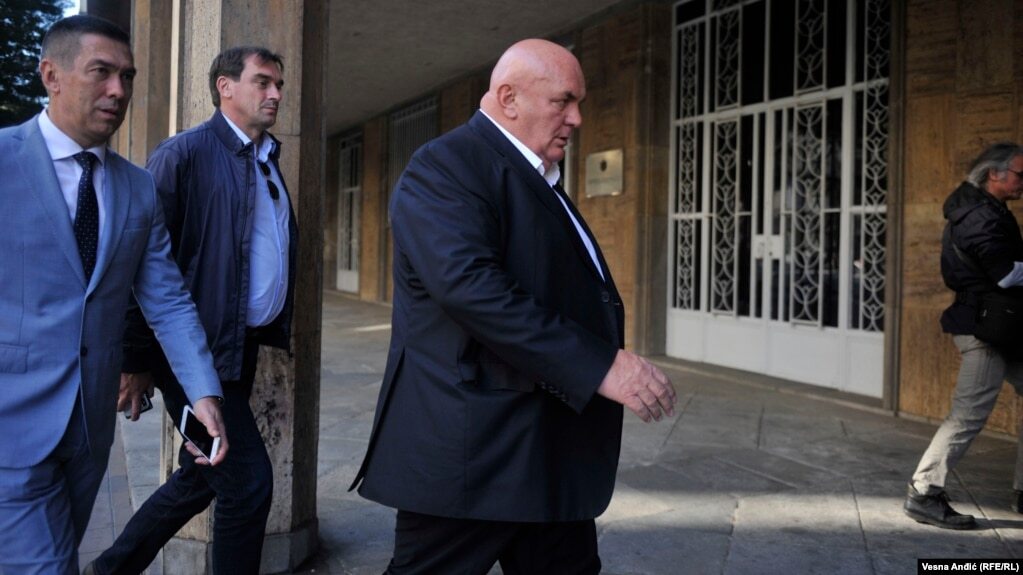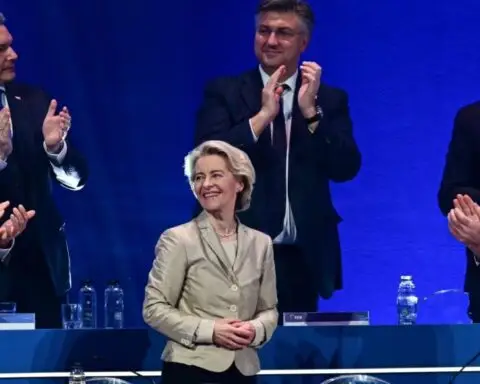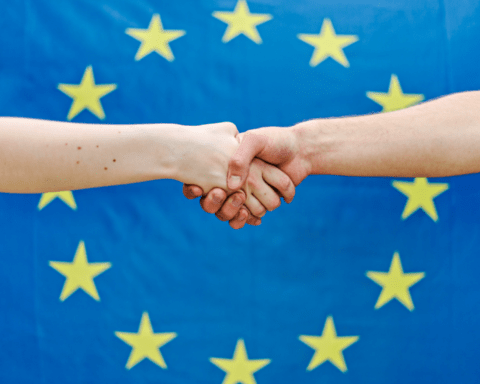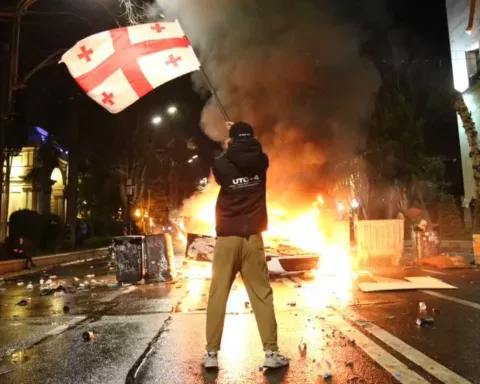The 60-year-old is currently a lawmaker in the National Assembly, chairman of the coalition party United Serbia (JS), and city council president of Jagodina, a quaint town 135 kilometers southeast of Belgrade.
He was also mayor of Jagodina for eight years until 2012, lifting up its bedraggled postindustrial profile with new trappings of tourism like an artificial waterfall, an aquapark, a zoo, a stadium, and a sprawling shopping center.
Markovic also served as a deputy minister of agriculture, forestry, and water management in Serbia’s first government after the ouster of strongman Slobodan Milosevic in 2001.
And during what many consider the peak of Serbian nationalism in the early 1990s, Markovic was a founder of a right-wing political party along with notorious Serbian paramilitary leader and gangster Zeljko “Arkan” Raznatovic.
Meanwhile, he has built up business holdings under the Palma brand that initially focused on trade and transport but also include a TV station and kickboxing club.
Markovic has frequently courted controversy during his life by using homophobic slurs, invocating “holy scripture” to assert Serbian claims to Kosovo, and by inviting Prime Minister Ana Brnabic — when she was a cabinet minister — to a “bunga-bunga” sex party.
But now he’s in uncharted legal and political waters, facing an investigation into accusations by an opposition lawmaker of “pimping” and an anonymous witness claiming to be a former employee who said Markovic organized and participated in exploitative sex with women and underage girls in Jagodina.
‘Going On For At Least 10 Years’
The local branch of Serbia’s public prosecutor’s office announced on April 20 that it had opened a case over allegations that Markovic had organized sex-capped gatherings in Jagodina attended by government officials and “girls aged 15, 16, and 17” from Belgrade while also making improper payments to minors.
The investigation followed circulation of a video and a press conference at which an opposition lawmaker, Freedom and Justice deputy chairwoman Marinika Tepic, presented videotape of a purported witness accusing Markovic of having “girls” shuttled by taxi from Belgrade.
The witness, whose identity was protected and who claimed to have worked at one of the venues, alleged that the young women then went with Markovic or his “coalition and business partners” at the gatherings.
“All this has been going on for at least 10 years, everyone knows that, but no one has spoken in this way,” Tepic said, adding that the case should lead to the fall of Serbia’s government.
President Aleksandar Vucic and Prime Minister Brnabic’s Progressive Party (SNS) has ruled in a coalition with an alliance that includes parliamentary speaker Ivica Dacic’s Socialists (SPS) and Markovic’s United Serbia party.
“The procurement of women and girls is an everyday thing in Jagodina, where Dragan Markovic ‘Palma’ rules,” Tepic said.
But she also warned of a broader national problem, too, saying “the pimping of women, girls, and little girls doesn’t happen only with the mafia but almost every day [elsewhere] in our Serbia as well.”
During a television appearance earlier this month, as word of the mounting accusations emerged, Tepic had alleged that “every woman in Jagodina who wants to get a job in the public sector” gets a “telephone for socializing,” with a job opportunity dependent on who she “hangs out” with.

The nongovernmental group ASTRA, which has two decades of experience trying to combat human trafficking and other forms of exploitation, publicly urged a thorough investigation.
“If it is established that this is a criminal offense of human trafficking, we remind you that the indictment must cover all persons involved in the trafficking chain — organized criminal groups, individual traffickers, and service users,” ASTRA said.
Markovic rejected the accusations as “terrible lies” and vowed to submit to investigators’ questions, which he did on April 20. He demanded a “speedy” investigation.
Markovic added, in a reference to his accusers, that “someone will have to go to prison for all of this.”
The accusations were a heavy public blow to a man who has courted power and controversy throughout much of his nearly 30 years of public life as an outspoken businessman and reluctantly pro-EU politician who cavorted among Serbia’s influential elite.
Nationalist Beginnings
Markovic co-founded the right-wing Party of Serbian Unity along with paramilitary Arkan in 1993, shortly after the Slovenian, Croatian, and Bosnian wars accompanying the initial breakup of Yugoslavia and with centrifugal forces still tearing at the country.
Arkan, a former petty criminal who was indicted for crimes against humanity for his actions as leader of the Serb Volunteer Guard during the wars, had already grown into a reputed mobster before his entry into politics.
Since Arkan’s death by assassin’s bullets in a Belgrade hotel lobby in 2000, Markovic has remained close to his widow, pop-folk singer Svetlana Raznatovic, better known as Ceca.
He moved on to form his current nationalist party, United Serbia, in 2004. That party has supported each of Serbia’s governments since 2007 and — starting with early elections in 2008 — has run in coalition with the Socialist Party (SPS) in all subsequent campaigns.
Since 2012, United Serbia’s support has helped bolster the consolidation of Serbia’s political landscape under Vucic.
Veering Toward Europeanism
Despite his well-chronicled attacks on EU social values, Markovic has spent much of the past decade embracing the notion of a Serbian rapprochement with the European Union.
“European integration, but not unconditionally, and only with Kosovo as part of Serbia,” Markovic told RFE/RL during negotiations to form a new Serbian government in 2008. “Resolution 1244 is holy scripture for me,” he added, in a reference to the UN resolution in 1999 that described the partially recognized Kosovo as part of rump Yugoslavia.
At the time, the Socialists with whom Markovic was allied were essential in the formation of a pro-EU government in Belgrade led by the Democratic Party of President Boris Tadic.
In December 2013, when the EU Council decided to launch accession negotiations with Serbia, Markovic publicly praised the development as the result of the efforts of Prime Minister Dacic and the deputy prime minister at the time, Vucic.
But he also touted his own, widely quoted witticism in support of closer Serbian ties with the European Union for practical and economic reasons.
“I won’t be immodest, but I will be objective: United Serbia gets great merit for [its support for EU accession] and for my famous sentence: ‘It’s not patriotism that’s poured into a tractor [but oil],'” Markovic said.
LGBT Slurs And ‘Bunga-Bunga’
But Markovic’s public persona has been punctuated by persistent slurs against homosexuality and the LGBT community, while always maintaining a jet-set image as he hobnobbed with the nationalist elite, including parliament speaker Dacic and President Vucic.
His kickboxing tournaments in Jagodina have featured Arkan’s son, Veljko Raznatovic.
A holiday image of Markovic and coalition partner Dacic dressed for the sun and sharing a scooter ride circulated on social media in 2016 when Dacic was foreign minister.

He gifted Vucic a French-branded hat after the Serbian head of state was mocked on social media for never wearing headgear, even in the snow.
His verbal attacks on the LGBT community have been less innocuous.
Markovic once told a TV audience that homosexuality was “a disease” and he would never in his life have a homosexual friend.
A Belgrade court convicted him in 2014 of a severe form of discrimination based on sexual orientation over remarks he made before a Pride Parade to support LGBT rights held under the threat of violence from counterdemonstrators in 2011.
At an official event at the Jagodina Zoo in 2012, Markovic mockingly “married” a male and female giraffe to send a message that “a male and a female, not two males, should marry.”
He made a running joke of perceived tolerance in the European Union for various sexual orientations.
“If we’re going to be led to Europe by homosexuals, then it’s better for us to stay where we are and herd sheep,” he said during public debate of antidiscrimination legislation aimed at harmonizing Serbian laws with those within the EU.
During a visit to Vienna in 2017, he said he “didn’t want to cross that pedestrian crossing” because a crossing light showed “not a man and a woman but two men holding hands.”
On the eve of Brnabic’s election as prime minister in 2017, he vowed not to vote for the openly lesbian politician, adding, “Ana Brnabic is not my prime minister.”
A year earlier, Brnabic had told Kurir newspaper that when she was minister of public administration and local self-government, Markovic had invited her to participate in one of his “bunga-bunga” parties, a phrase made infamous in testimony in Italy by a former underage prostitute in reference to alleged sex romps with the rich and powerful, including Prime Minister Silvio Berlusconi.
Asked what “bunga-bunga” parties Markovic meant, Brnabic said: “That’s what I asked. He explained to me: At these bunga-bunga parties we have fun, we sing, men and women can kiss, women and women can kiss, but men can’t [kiss] men.”






